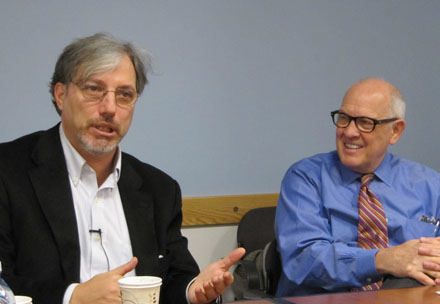Alterman: U.S. democracy obstructs progressive change

March 29, 2011 — The problematic American democratic system is the subject of a new book by Eric Alterman, Kabuki Democracy: The System vs. Barack Obama. Alterman, Distinguished Professor of English and Journalism at Brooklyn College and CUNY Graduate School of Journalism; columnist for The Nation; and regular contributor to The Daily Beast, spoke at the Shorenstein Center about how the fundamental problems with American democracy and the way it is covered by the media prevent progressive change.
The title of the book comes from the Japanese dramatic art form of imitation, Alterman explained. “We’ve reached a point where we’re going through the motions of democracy, imitating democracy…when in fact the substance is all but gone.” The thesis of the book, Alterman stated, is that “there is something fundamentally wrong with the system” in which “you elected a president who is as impressive and progressive a figure as you could hope to elect in this country, with super majorities in both houses of Congress…and yet you didn’t get what you voted for.”
Alterman outlined three major problems with the U.S. system of democracy. One is the “issues that are permanent problems, permanent fixtures of our political discourse that are treated as if they just happened yesterday and nobody could possibly have known about them.” He used the oil spill off the Gulf of Mexico last year as an example of a disaster that was warned about by a U.S. civil engineering agency, but the warnings were not covered by the media. While there might be warnings of future disasters, the “media can’t incorporate that knowledge — everything is shocking.”
Another problem is the “antiquated political system” that allows for “ease of political obstruction.” During Obama’s administration, Republican members of congress united to use the “power of obstruction much more prodigiously than had ever been used before.” Alterman added, “Conservatives who seek to obstruct government action have an enormous advantage over Democrats and liberals because Americans are naturally libertarian,” and hesitate to support government power.
Finally, Alterman said, the “power of money” is so pervasive in the democratic system, that it’s “pointless to discuss any issue at all without bringing in the role of money, and we almost never think about it.” The way the culture of finance works in legislation, he explained, is that finance and banking committees in the Senate are comprised of people who “have worked or will work for a bank,” and who are looking to use legislative experience to get hired with a financial institution.
Alterman admitted that he has been disappointed by Obama, but acknowledged, “The real problem is not Barack Obama, the problem is the system that will not allow for progressive governance.”
This article was written by Janell Sims, Shorenstein Center. Photos were taken by Heather McKinnon, Shorenstein Center.